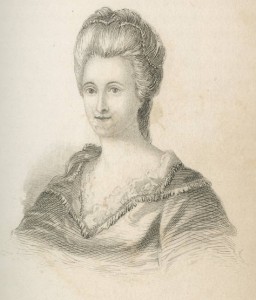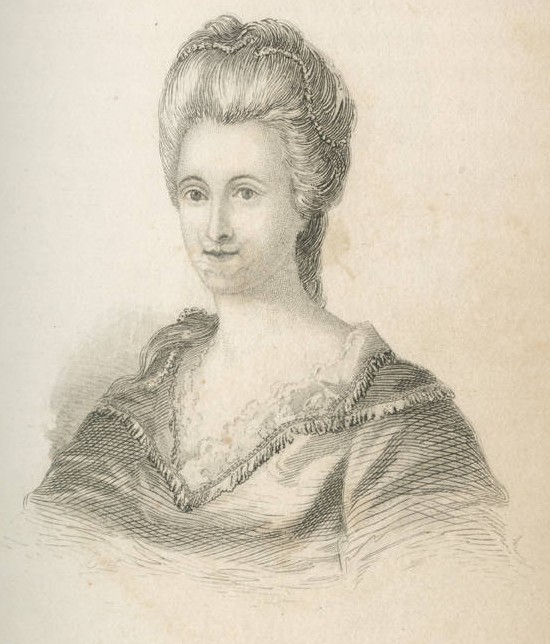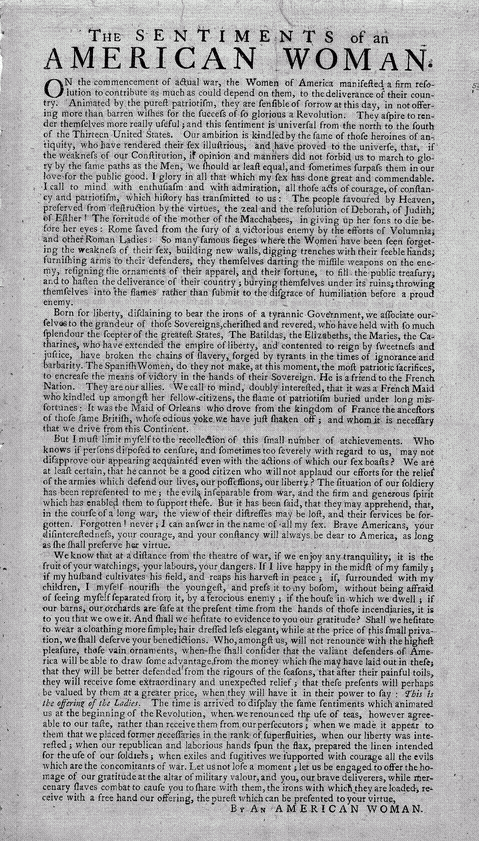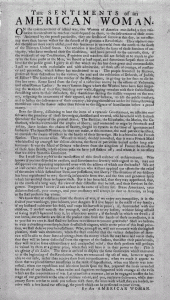Ladies Association of Philadelphia
Essay

Philadelphia was a center of patriotic fervor and activity during the American Revolution. Many of its residents, including women, participated in the war for independence by providing material and moral support for the “patriot” cause. On June 12, 1780, one such Philadelphian, Esther De Berdt Reed (1746-80), penned a broadside entitled “Sentiments of an American Woman” in order to rouse her fellow women to participate in the Revolutionary cause. As a result, dozens of women responded to Reed’s call, forming the Ladies Association of Philadelphia, a group of upper-class women who led a door-to-door campaign raising money for Washington’s Continental Army. Through their efforts, the Association “ladies” came to recognize their essential role in winning American independence.
Reed’s tract summoned her female peers to fulfill the promise they made at the outset of the war, asserting that women were both “animated by the purest patriotism” and “born for liberty,” authoritatively dismissing the notion that women were not patriotic or political beings. The broadside harked back to women of the past who had proven the merit of their patriotic contributions, providing a precedent for women’s political activism. Compelling her female compatriots to aid the suffering of the soldiers, Reed reminded Philadelphia’s women how they, along with women across the colonies, had participated in the boycotting of teas, as well as spinning bees, both feats of female political activity performed in the name of the American cause. The “offering of the Ladies,” Reed averred, was nothing new; indeed, she was merely impressing upon her audience the need to reaffirm the commitment they had already made to the Revolution.
Just three days after the Pennsylvania Gazette published the broadside under the title “Sentiments of an American Woman,” more than thirty women gathered to discuss the best way to aid the Revolutionary troops. After a productive meeting, the newly formed Ladies Association of Philadelphia published its notes, which appeared in newspapers across the British colonies. Members similarly wrote letters to their acquaintances in neighboring colonies suggesting that they imitate the efforts of the LAP. Sarah Franklin Bache (1743-1808) followed suit and wrote letters to her female friends soliciting their assistance, and women in New Jersey and Maryland copied the Ladies Association of Philadelphia model in their own fundraising efforts.Working independently and without the assistance of men, the Association collected more than $300,000 Continental dollars. Though the group originally desired that the funds be distributed directly to the soldiers as remuneration for their patriotism, Washington desired that the funds be used to purchase materials for and manufacture clothing which the Continental Army needed desperately. Washington thanked the Association for the group’s contribution to the cause of liberty, and one soldier composed a poem in the women’s honor, recognizing “the patriot females who their country save.”The work of the Ladies Association of Philadelphia became a model of political activity for women in the years of the early republic. Most importantly, these Philadelphia women proved their mettle, took the initiative to participate in the American cause, and recognized their essential contribution to the colonies’ ultimate victory.
Jacqueline Beatty is a Ph.D. student in the Department of History and Art History at George Mason University. (Author information current at time of publication.)
Copyright 2013, Rutgers University
Gallery
Links
- Ideas, Relative to the Manner of Forwarding to the American Soldier The Presents of the American Women. (American Memory from the Library of Congress)
- “The Attempt is Praise" (The Crucial Decade: 1780s, Rollins College)
- Portraits of American Women (Library Company of Philadelphia Digital Collections)


